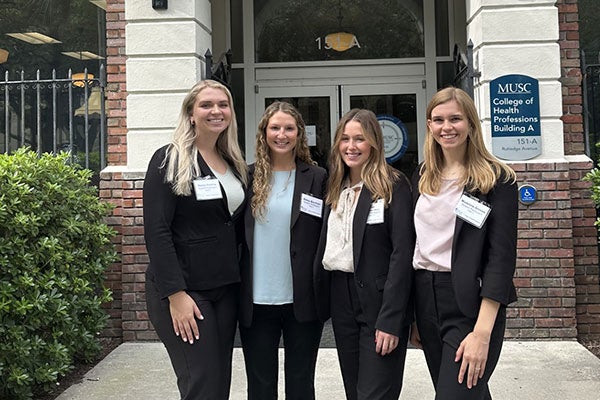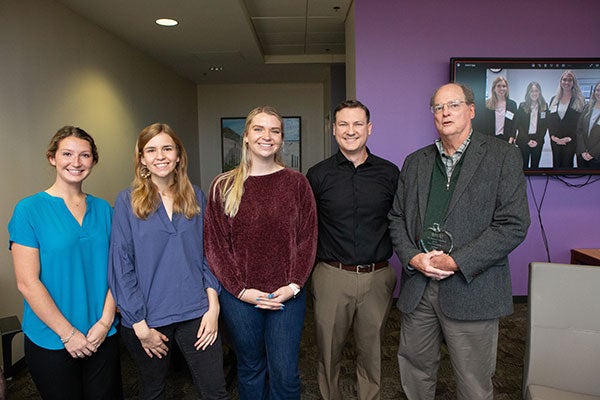Health services management students
The College of Allied Health Sciences’ health services management program continues to make its name on the national stage, finishing second place at the annual undergraduate health services case competition hosted by the Medical University of South Carolina on Oct. 6.

ECU health services management students gather outside of the Medical University of South Carolina during a break in their 2023 case competition. (Contributed photos)
This year marked the third that an ECU group has competed. The 2019 team garnered experience from their participation, and the 2022 team fared much better but didn’t place in the competition’s top four schools.
This year’s team, however, swept into second place, outpacing seven other schools with competition experience informed by long-established health services management programs with degree programs at master’s and doctoral levels in addition to their undergraduate programs.
Kasey Perkins, a senior health services management student and president of the Honors College student council, was raised in Cary but now calls the Lake Norman area home. She came to ECU to study physical therapy but after job shadowing, she came to the realization that with her skill set and interest she could do more good as a health care administrator than as a clinician.
So, when she was asked at the beginning of her senior year to participate in a health care case competition at the Medical University of South Carolina in Charleston, she leapt at the opportunity.
This year’s team got started with research and planning in late summer with little more than a month to prepare.
“At first it seems like something to put on your resume but looking back, now that we’ve actually been to the competition, it was great to work as a team and go in depth with the topics we were given,” Perkins said.
The ECU team consisted of Perkins; seniors Sarah Barrington-Walls and Madeline Grimes; and Baily Barefoot, a junior in the health services management Bachelor of Science degree program.
The scenario involved insurance companies denying insurance approvals for gastroenterological disease such as Crohn’s disease and ulcerative colitis. The students in the competition needed to devise ways to build relationships between health care providers and insurance providers, as well as patient safety, patient advocacy and telehealth options for improved health care delivery.

Members of ECU’s 2023 health services management case competition team pose with Dr. Robert Kulesher, right, and Dr. Ray Hylock, HSIM department chair, during a recognition ceremony at ECU.
Dr. Robert Kulesher, the team’s faculty advisor and coach, had praise for the students’ undaunting ability to critically analyze the case materials and formulate a professional presentation.
“Last year’s team finished outside of the top four, so the success that this year’s team found against well-established competitors was a significant leap forward,” Kulesher said.
The team’s solution was to encourage larger organizations, like major health care systems, to shepherd smaller clinics and practices through the claims process to get claims backlogs unstuck from the oftentimes tricky labyrinthine health insurance claims system.
“We developed our solution from interviews that we did with people at the Brody School of Medicine, ECU Health and some providers in Wilmington. The competition judges complemented our use of interviews with providers and patients, not just looking at online at research,” Perkins said.
And how did this year’s team rocket from not even placing in the competition to second place?
“Last year they took points off on our rubric because our team had really great analysis but didn’t have concrete solution to present to the judges,” Perkins said. “Our biggest goal this year, once we did our analysis, was to present a solution that could actually be implemented.”
Team members were pleased, not only with the strong showing at the competition, but with making connections with students from other universities they will likely work alongside in the health care industry after graduation.
“It was awesome to talk to other students who are part of nationally recognized programs for health administration, especially since we are a smaller program,” Perkins said.
MORE BLOGS